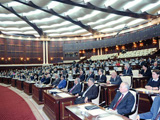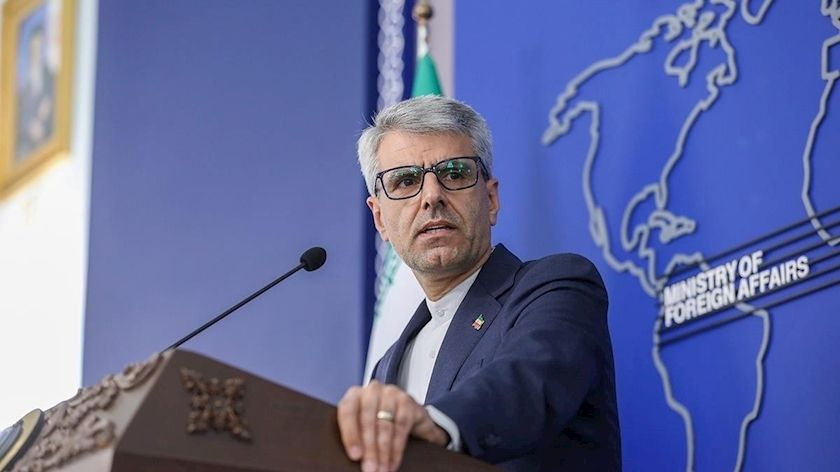|
|
TODAY.AZ / Politics
Azerbaijan may issue education loans for students
19 January 2012 [20:03] - TODAY.AZ
 The parliamentary committee on economic policy recommended the bill on "Education loans" to be considered by the Azerbaijani Parliament after the meeting on Thursday. "Every second of three students in Azerbaijan gets paid education," MP Ali Masimli said at a meeting. "The average cost of education is 2,000-2,500 manat per year. Not all students are able to cope with this financial burden. There is a need to adopt this law."
The parliamentary committee on economic policy recommended the bill on "Education loans" to be considered by the Azerbaijani Parliament after the meeting on Thursday. "Every second of three students in Azerbaijan gets paid education," MP Ali Masimli said at a meeting. "The average cost of education is 2,000-2,500 manat per year. Not all students are able to cope with this financial burden. There is a need to adopt this law."According to the bill, the loans will be given to finance education in higher and secondary special educational institutions. It was stressed that these loans may be given to pupils of secondary schools and other educational institutions in the future.
The loans will be given in two forms - as commercial loans and social loans. Depending on the destination, they can be issued to refund the basic cost of education and / or to ensure the costs of food, housing, transportation and other costs during the education period. Loans can be financed through the public funds, own funds of banks, as well as other sources not prohibited by law.
According to the bill, the amount of education loans must be sufficient to fully to cover the costs of education and / or the associated costs. The annual amount of a part of the loan is directly related to education. It can not be less than the sum of the borrower's main costs on education. The sum of the education costs may not exceed the average monthly cost of rent and double amount of the subsistence level.
The loans may be granted not only to the students paying for their education. The students, receiving free education, can receive a loan for the food, housing, transportation, textbooks and stationery, etc.
A person, who has received a loan for education, may participate in one loan agreement for each degree (bachelor's, master's, doctorate).
"The commercial loans are issued with a maximum interest rate of 5 percent per annum," the bill said. "The maximum interest rate of the education loans is the same for all the authorized banks. The loans for social education will be issued only to members of poor families and without interest. The loans are granted up to 20 years."
According to the bill, the education loans are supported by the state by creating the education loan fund, issuing a loan to this fund and the authorized banks at the expense of funds envisaged in the state budget, as well as by liquidating the debt on social loans. The state must allocate the funds from the state budget to support the education loans each year.
Masimli said that according to the preliminary data, about 15 million manat are planned to be allocated from the state budget per year or 1 percent less than the funds allocated from the budget to education.
"They will not be allocated from the funds envisaged for education in the state budget," he said.
The control over the implementation of the program of loans for education and other documents prepared on the basis of the conceptual principles of the law will be implemented by the relevant executive body and the Accounting Chamber.
/Trend/
URL: http://www.today.az/news/politics/101291.html
 Print version
Print version
Views: 1056
Connect with us. Get latest news and updates.
See Also
- 15 October 2025 [15:13]
President Ilham Aliyev addresses participants of 3rd National Urban Forum - 15 October 2025 [14:50]
President Ilham Aliyev receives delegation headed by OSCE Chairperson-in-Office - 15 October 2025 [13:49]
Urban planning is a priority direction in Azerbaijan’s national development strategy - President Ilham Aliyev - 15 October 2025 [13:47]
President Ilham Aliyev approves agreement on cooperation in education between Azerbaijan and Brazil - 15 October 2025 [13:41]
Over 22,000 IDPs resettle in their hometowns - 15 October 2025 [13:37]
President Ilham Aliyev approves agreement on cooperation in healthcare with CIS countries - 15 October 2025 [12:12]
Why couldn't Azerbaijan not be in Sharm el-Sheikh - 15 October 2025 [01:43]
Court continues hearings in Ruben Vardanyan’s war crimes case - 14 October 2025 [18:09]
Over 55,000 return to liberated territories of Azerbaijan as part of Great Return Program - 14 October 2025 [15:27]
Armenia rejects Azerbaijan’s demand for constitutional changes before peace deal
Most Popular
 Azerbaijan set to handle 15 mln tons of rail cargo annually
Azerbaijan set to handle 15 mln tons of rail cargo annually
 Why couldn't Azerbaijan not be in Sharm el-Sheikh
Why couldn't Azerbaijan not be in Sharm el-Sheikh
 Mustafayev: Trilateral dialogue strengthens Azerbaijan–Iran–Russia partnership
Mustafayev: Trilateral dialogue strengthens Azerbaijan–Iran–Russia partnership
 Afghanistan-Pakistan clashes leave scores dead amid rising tensions
Afghanistan-Pakistan clashes leave scores dead amid rising tensions
 Trilateral consultations in Baku highlight regional cooperation agenda - Iranian FM
Trilateral consultations in Baku highlight regional cooperation agenda - Iranian FM
 Between Washington and Middle East, Azerbaijan’s role gains new weight
Between Washington and Middle East, Azerbaijan’s role gains new weight
 US will send Ukraine Tomahawks if war unresolved
US will send Ukraine Tomahawks if war unresolved
